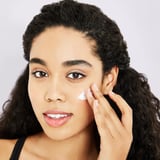dimanche 16 décembre 2018
Can Your Skin Type Change? We Asked the Experts

I've had oily skin for as long as I can remember, and by the time I was a senior in high school wearing makeup regularly, I had pretty much tried out every little trick I found on the internet to try to permanently banish all the excess oils from my face. When nothing seemed to work for me, I figured that my relationship with blotting papers would undoubtedly last a lifetime. That is, until very recently when I noticed that the midafternoon shine I once found myself constantly fighting off hasn't been as large of an issue for me anymore. My skin, as of late, has been somewhere in the normal area - not too oily, but also not too dry.
With all of that considered, I instantly began to question if my skin type has changed and whether that's even possible. So first things first: dermatologists say it is possible for your skin type to change. But because it is determined by your genes, how it changes is a little complicated.
If you've noticed that your normally oily skin is crossing over into normal, combination, or dry territory, then you can chalk a lot of that up to aging.
According to dermatologist Dhaval Bhanusali, MD FAAD, if you've noticed that your normally oily skin is crossing over into normal, combination, or dry territory, then you can chalk a lot of that up to aging. "When in our teens and 20s, hormones are pumping and we have increased oil production," he told POPSUGAR. "As we age, this tends to decrease, which leads our skin to become [drier] and more irritated." But it's not just aging that can do a number on your skin or impact the way it feels over time. Another factor to consider is weather.
"The weather significantly impacts your skin, which may feel heavy or greasy during the humidity of the Summer and dry or flaky in the cold of the Winter," said dermatologist Joshua Zeichner, MD. Warmer weather can cause your skin to feel much oilier than usual, and that oil can later become trapped on your skin when it mixes with sweat and dirt. On the flip side, cold weather and wind both have the ability to strip the skin of natural oils, which can inevitably cause dryness.
And while weather is an external factor that's simply out of your control, it's also possible that your skin's condition could be fluctuating as a result of your own habits. You can inadvertently dry out your skin by drinking coffee and not balancing it out with water, Bhanusali said, while other things like overexfoliation can cause your skin to produce more oil than usual. "You can strip all the 'good' oils from your skin and actually cause breakouts due to compensatory hypersecretion of oils into your pores," he explained.
Whatever your skin's condition, you still have a lot of control over the products you use to manage it. If oily skin is normally an issue for you, Bhanusali recommends using products with salicylic acid that absorb into oil glands and decrease production, while Zeichner recommends using a foaming cleanser. As for those with drier skin, the key to getting it under control is using hydrating products.










0 comments:
Enregistrer un commentaire